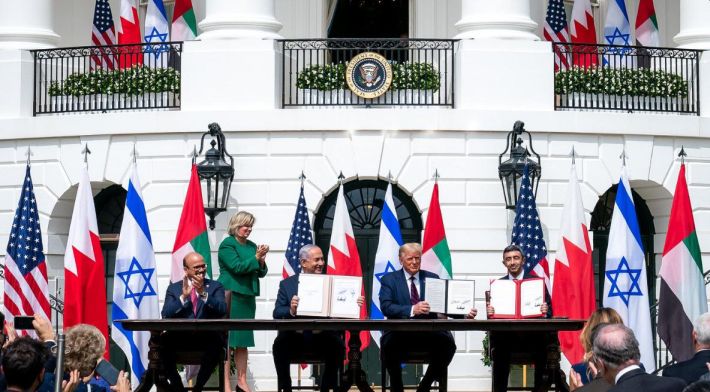By Eric Vandenbroeck and co-workers
The Fallacy of the Abraham Accords
US. President Donald
Trump’s efforts to cement his legacy in the Middle East were well underway even
before he reclaimed the White House. “There’s just no way that President Trump
isn’t going to be interested in trying to expand the Abraham Accords,” Jason
Greenblatt, Trump’s former Middle East envoy, told thousands of international
delegates at Qatar’s Doha Forum in December. The Abraham Accords, a series of
normalization deals signed in 2020 by Israel and Bahrain, Morocco, and the
United Arab Emirates, remain Trump’s signature foreign policy achievement from
his first term, and one hailed by both his allies and staunchest political
opponents—including former President Joe Biden.
Indeed, Biden not
only wholeheartedly embraced the Abraham Accords but sought to build on them by
securing a landmark deal with Saudi Arabia, the most powerful and influential
Arab state. Biden’s offer was that, in return for Saudi-Israeli
normalization, the Saudis would get a major upgrade in the
strategic partnership with the United States, on par with that of a NATO
ally. A Saudi-Israeli agreement would be the biggest
breakthrough in Arab-Israeli diplomacy since Egypt broke ranks with the Arab
world and became the first Arab state to sign a peace treaty with Israel in
1979—and would pave the way for other Arab and Muslim nations to follow suit.
This approach to Arab-Israeli peacemaking, however, is contingent on
sidestepping the Palestinian question. Up until 2020, the consensus among Arab
states had been that normalization with Israel would come only after the
creation of an independent Palestinian state. The decision by Bahrain, Morocco,
and the United Arab Emirates to break ranks therefore effectively robbed
Palestinians of an important source of leverage against Israel. Since then,
Hamas’s October 7 attack on Israel and Israel’s devastating war on Gaza has
effectively derailed the Saudi-Israeli track, in an
explicit reminder that the Palestinian question cannot be ignored or
subordinated to Arab-Israeli normalization.
Despite these
obstacles, Trump is keen to finish the job he began in his first term and Biden
carried forward, by clinching a U.S.-Saudi-Israeli
mega-deal in a return to the original vision of the Abraham Accords, which
involves upgrading Israel and downgrading the Palestinians. All signs indicate
that Trump continues to believe that Israel’s integration in the region is more
important to Arab leaders than is the cause of Palestinian freedom. According
to Greenblatt, it is a mistake to “think that the Israeli-Palestinian
conflict is the be-all and end-all, and if everything gets resolved between
Israel and the Palestinians, all will be great in the Middle East.”

A Palestinian flag near rubble in Rafah, the Gaza
Strip, January 2025
Critics of the
Abraham Accords, however, have never claimed that resolving the Israeli-Palestinian conflict would end all other disputes in
the region. They have instead argued the opposite: that regional peace and
security are not possible without a resolution of the Palestinian question.
Indeed, the central premise of the Abraham Accords—that regional peace and
stability could be achieved while sidelining Palestinians—has been totally
upended by Hamas’s October 7 assault on Israel, and everything that has
happened since. A cease-fire deal that went into effect this week underscores
the centrality of the Palestinians to regional security and stability, but it
also potentially creates diplomatic space for renewed Saudi-Israeli
engagement under Trump’s leadership. The Abraham Accords represent a revealing
point of continuity between Trump and Biden. Their reasons and tactics may
differ, but both presidents have peddled a dangerous illusion—that peace,
stability, and prosperity in the broader Middle East could coexist with war,
chaos, and dispossession in the occupied Palestinian territories.
Meanwhile, claims
that Arab states could leverage their budding relations with Israel to advance
the cause of the Palestinians or that of a two-state solution have simply never
materialized. Neither Bahrain, Morocco, nor the United Arab Emirates have sought
to intervene with Israel to prevent home demolitions or evictions of
Palestinians from their homes in East Jerusalem, or to address record-breaking
settlement expansion and settler violence across the West Bank. They have not
wielded their supposed influence to step in regarding Israel’s assault on
Gaza—an offensive that has already killed more than 46,000 Palestinians and
annihilated most of its civilian infrastructure. On the other hand, Emirati
officials have shown little compunction about doing business with Israeli
settlers or investing in occupation infrastructure such as Israeli checkpoints.
Whereas Biden and congressional Democrats have strained to elide these
inconsistencies, Trump and his fellow Republicans, most of whom have already
abandoned even the pretense of support for a two-state solution, can simply
ignore these contradictions altogether.
Peace on Paper
Despite being lauded
as a diplomatic triumph, the Abraham Accords were premised on several faulty
assumptions. Indeed, much of the excitement surrounding the normalization deals
in 2020 had less to do with their intrinsic value than with the almost reflexive
need, particularly in Washington and other Western capitals, to rally around
something that was so obviously in Israel’s interests, regardless of its actual
alignment with U.S. policy objectives, such as a two-state solution or regional
stability. This tendency to conflate “good for Israel” with “good for peace” is
a standard feature of the U.S.-led diplomatic process and a key reason for its
failure over the past several decades.
Although many have
tried to fit the square peg of normalization into the round hole of a two-state
solution, the fact remains that the Abraham Accords were originally conceived
as a way to bypass the Palestinian question and suppress Palestinian agency in
the hope that Palestinians would have no choice but to accept whatever
long-term arrangement the United States, Israel, and the region imposed on
them. The Abraham Accords were themselves one of the many trends working
against a two-state solution—a sign that certain Arab states had moved on and
were no longer willing to subordinate their bilateral or geopolitical interests
vis-à-vis Israel to the unicorn of an independent Palestinian state.
Moreover, the Abraham
Accords removed one of the few sources of leverage Palestinians had in their
already highly asymmetrical conflict with Israel: pressure from Arab neighbors
whose publics were still overwhelmingly sympathetic to the Palestinian cause.
In so doing, they also eliminated some of the last remaining incentives Israel
had to end its occupation of Palestinian territory or otherwise acknowledge
Palestinian rights. The absence of constraints on Israel has left Palestinians
ever more vulnerable to the whims of an increasingly violent and maximalist
Israeli occupation, which saw unprecedented settlement expansion, settler
violence, and Israeli army repression against Palestinians in the West Bank and
East Jerusalem, as well as more routine wars in Gaza in 2021 and 2022. These
issues have only worsened under Prime Minister Benjamin Netanyahu, whose return
in late 2022 marked the arrival of the most far-right government in Israel’s
history.
Meanwhile, claims
that Arab states could leverage their budding relations with Israel to advance
the cause of the Palestinians or that of a two-state solution have simply never
materialized. Neither Bahrain, Morocco, nor the United Arab Emirates have sought
to intervene with Israel to prevent home demolitions or evictions of
Palestinians from their homes in East Jerusalem, or to address record-breaking
settlement expansion and settler violence across the West Bank. They have not
wielded their supposed influence to step in regarding Israel’s assault on
Gaza—an offensive that has already killed more than 46,000 Palestinians and
annihilated most of its civilian infrastructure. On the other hand, Emirati
officials have shown little compunction about doing business with Israeli
settlers or investing in occupation infrastructure such as Israeli checkpoints.
Whereas Biden and congressional Democrats have strained to elide these
inconsistencies, Trump and his fellow Republicans, most of whom have already
abandoned even the pretense of support for a two-state solution, can simply
ignore these contradictions altogether.
Unfinished Business
Even with the slight
opening provided by the cease-fire, however, bringing the Saudis into the
Abraham Accords will remain an uphill battle for the Trump administration. If
prospects for a Saudi-Israeli deal seemed remote
before October 7, the environment today is considerably less hospitable. The
horrific scenes of death, destruction, and starvation coming out of Gaza over
the last 15 months have inflamed public opinion across the Arab and Muslim worlds
and shredded Israeli and U.S. credibility across the global South. (Some
traditional Western allies in the global North, such as Ireland, Norway, and
Spain, have also begun distancing themselves from Israel.) Even the United Arab
Emirates, once the poster child for Arab-Israeli
normalization, has been forced to downplay its ties to Israel: Emirati
businesses no longer boast of their Israeli connections, and UAE leaders’
once-warm relationship with Netanyahu has cooled. In other words, the Gaza war
may not have ruptured the Abraham Accords—but it has effectively put them on
ice.

For the Saudis, the price
of normalization with Israel has increased considerably since October 7 and the
ensuing assault on Gaza. Whereas the country’s de facto leader, Crown Prince
Mohammed bin Salman (also known as MBS), had previously sought only a
rhetorical commitment from Israel to a Palestinian state, Riyadh is now
demanding concrete steps toward statehood. Having despaired of U.S. mediation,
the Saudis have teamed up with France to launch a new initiative aimed at
rescuing whatever may be left of a two-state solution. In any case, it would be
difficult for MBS, who is not known for his sentimentality toward Palestine, to
normalize relations with a state that he and his government have accused of
committing “genocide” and “ethnic cleansing.” The International Criminal
Court’s indictment of Netanyahu and former Israeli Defense Minister Yoav
Gallant for war crimes and crimes against humanity present yet another barrier
for Riyadh. Saudi Arabia’s current stance may be best reflected by a communiqué
adopted by the Arab-Islamic summit held in Riyadh last month, which not only
reiterated the genocide charge but called for expelling Israel from the United
Nations—that is, precisely the opposite of normalization.
Moreover, as the
costs of regional engagement with Israel have gone up, the expected returns
have only gone down. The one thing Saudi and other Gulf leaders value above all
else is stability. But the last 15 months—which have seen Israel’s annihilation
of Gaza, an extensive war with and occupation of Lebanon, tit-for-tat strikes
with Iran, and the invasion and seizure of large swaths of Syrian territory
following the fall of the Bashar al-Assad regime—have been anything but stable.
If the promise of the Abraham Accords was peace and stability, the reality of
Netanyahu’s so-called new Middle East has been one of endless bloodshed and
instability. What is on offer today is not a vision involving the peaceful
integration of Israel in the region but one based on Israel’s violent
domination of it.
Not only have the
Abraham Accords not brought peace and security to the Middle East, but they
have helped to produce the opposite by emboldening Israeli triumphalism,
entrenching Israeli maximalism, and ensuring Israeli impunity. The belief
that Arab-Israeli normalization could proceed over the
heads or at the expense of the Palestinians was at best misguided and at worst
dangerous, as recent events demonstrate. It took nearly three years and the
deadliest violence in the history of the Israeli-Palestinian
conflict for the Biden administration to finally come to terms with this
reality; the Trump administration would do well to learn the same lesson.
For updates click hompage here